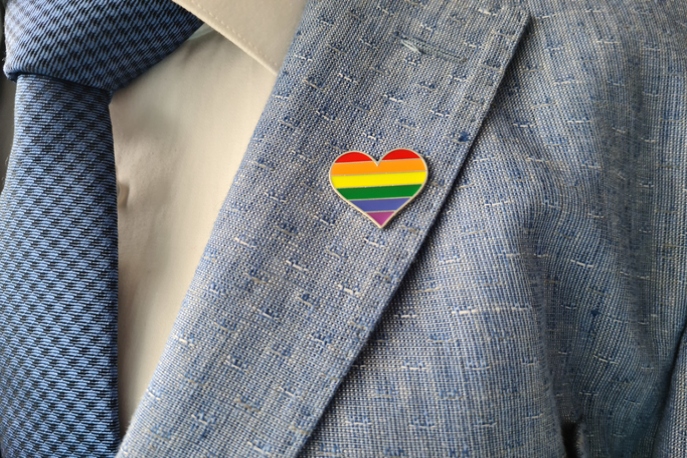Photo Credit: Nadzeya Haroshka
It’s officially Pride Month! In June, members of the LGBTQIA+ community not only celebrate who they are, but advocate for all facets of the community in which they live and work to act as allies. For workplaces across the country, demonstrating allyship to LGBTQIA+ employees is not just a moral choice…it’s a good business practice too. To be an ally is to make a space safe for someone to live and thrive exactly as they are. As an organization focused on eliminating workplace sexual harassment, we are discussing the business case for making workplaces safer for LGBTQIA+ people and outlining some tips for how to make that happen.
Sexual harassment, misconduct, and abuse are largely underreported crimes. The data we do have shows that, even with this underreporting, sexual harm is incredibly prevalent in our society. With regard to workplaces, one study found that, “Thirty eight percent of all women and fourteen percent of men have reported experiencing sexual harassment at work,” (Kearl, Johns, & Raj, 2019). For LGBTQIA+ people, who experience disproportionate levels of overall sexual harm compared to their straight and cisgender peers, there is an increased risk of workplace sexual harassment, misconduct, and abuse. The Williams Institute found that, “One in five (22%) LGBTQ employees reported sexual harassment, and one in six (16%) reported physical harassment at work because of their sexual orientation or gender identity.” An alarming 77% of young LGBTQIA+ people have faced workplace sexual harassment, stemming from people they cater to in the customer service setting as well as fellow colleagues.
Knowing the issue of sexual harm against a minority and implementing preventions against it is not only ethical, but it makes good business sense too. In our previous blog, “The Business Case for Preventing Sexual Violence and Protecting Survivors,” we discussed how important it is for businesses to invest in local anti-sexual violence organizations and projects. In our argument, we highlighted the following:
“The Institute for Women’s Policy Research (IWPR) found that employees who experienced sexual harm reported poor mental and physical health conditions, increased financial hardships, and reduced access to job-learning and advancement opportunities. To put it in financial terms: one study estimated $22,500 in lost productivity per person for people impacted by sexual harassment at work, making clear the impact of sexual violence on the individual, but also the bottom line.”
Improving employee welfare boosts general employee morale, thereby prompting better output across the board. It also saves both individuals and companies at large the cost of legal fees and health care costs that may emerge post-sexual harm.
The good news is that there are plenty of resources and organizations to learn from to directly combat sexual harassment against LGBTQIA+ employees. Below are some of our recommendations.
Collaborate with RALIANCE Grantees for Trainings
Through our grant program, RALIANCE has been proud to invest in organizations that work to eradicate sexual harassment, misconduct, and abuse on the local, state, and national levels. Two of our grantees are proud to partner with workplaces committed to LGBTQIA+ workplace sexual harassment prevention. Right To Be offers a bystander training to support the LGBTQIA+ community, and FORGE, Inc. offers trainings that are specifically catered to supporting the trans community. Both of these organizations can be a wonderful place to start to empower employees to spot, prevent, and handle sexual harassment against their LGBTQIA+ colleagues.
Form Inclusive Policies That Factor LGBT-Specific Sexual Misconduct
Sexual harassment, misconduct, and abuse can look different for different communities. For senior staff, it would benefit them to set aside time to learn about how sexual harm and other forms of harassment might manifest in ways that they might not recognize. Some examples include:
-Outing someone
-Invasive questions about a trans or gender non-conforming person’s body
-Deliberate misuse of pronouns
-Comments or “jokes” about one’s sexual preferences or behaviors based on their gender identity or sexual orientation
-LGBTQIA+ slurs
It is important to have a good understanding of these microaggressions in order to form an exhaustive, inclusive workplace sexual violence prevention policy. RALIANCE has laid out a taxonomy to help make the processing of such behaviors easier and would be happy to work with any clients interested in learning more.
Provide Multiple Reporting Avenues Internally and Externally
At RALIANCE, we believe one of the most crucial elements to sexual violence prevention is providing survivors with expanded reporting options. Limiting a colleague to one person might prevent a survivor from coming forward, particularly if they have a limited/bad relationship with that person or if they are the one who caused the harm in the first place. We recommend having not only multiple point-people on staff to process these complaints, but to also have external contacts in case the survivor needs resources but wants to maintain privacy. FORGE, Inc. has laid out some Workplace Harassment resources that staff can keep on hand. We also recommend forging relationships with local LGBT centers to pass along any local hotlines, support groups, attorneys, or other resources specific to the survivor’s area.
This Pride Month, we affirm our commitment to ensuring that members of every community get to work in places safe from sexual harassment, misconduct, and abuse. We look forward to the ways the businesses in our lives demonstrate to their industry partners the power in supporting these colleagues, this month and every month.
RALIANCE is a trusted adviser for organizations committed to building cultures that are safe, equitable, and respectful. RALIANCE offers unparalleled expertise in serving survivors of sexual harassment, misconduct, and abuse which drives our mission to help organizations across sectors create inclusive environments for all. For more information, please visit www.RALIANCE.org.

